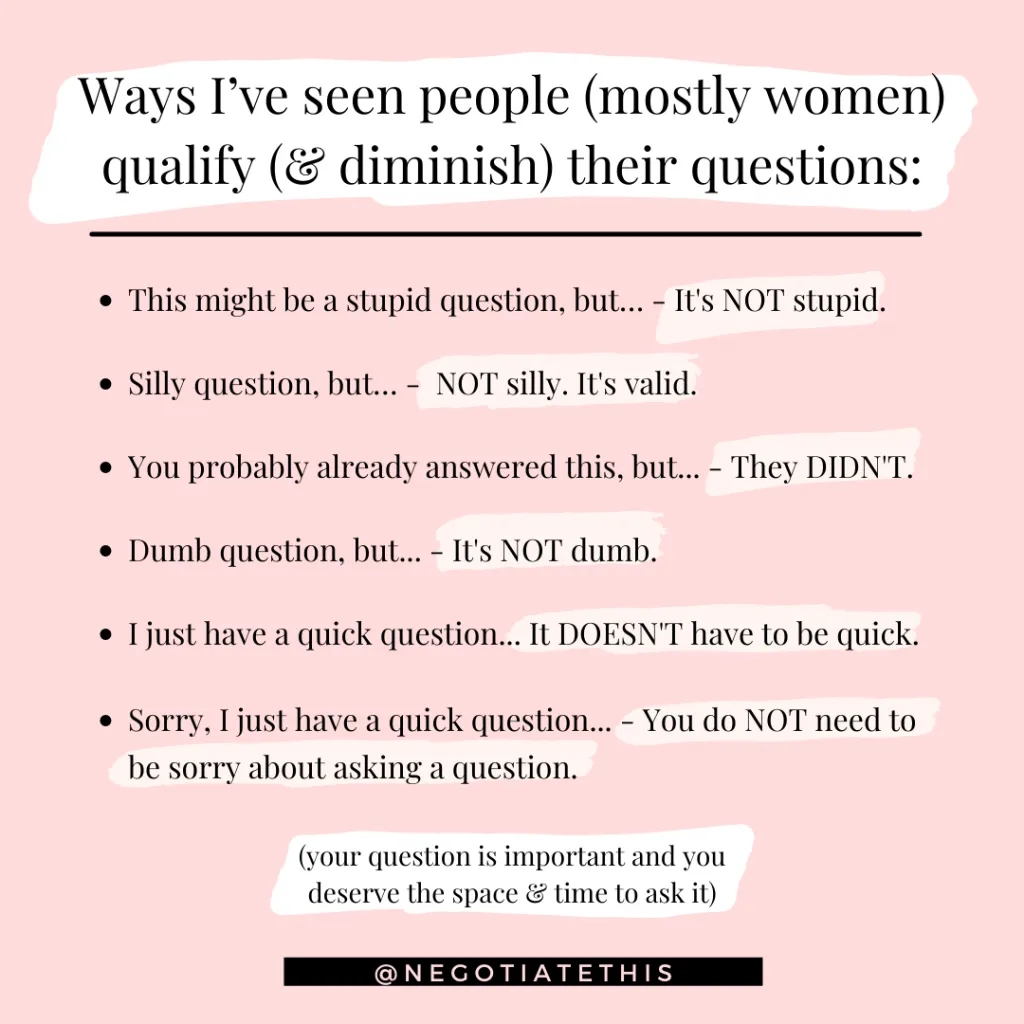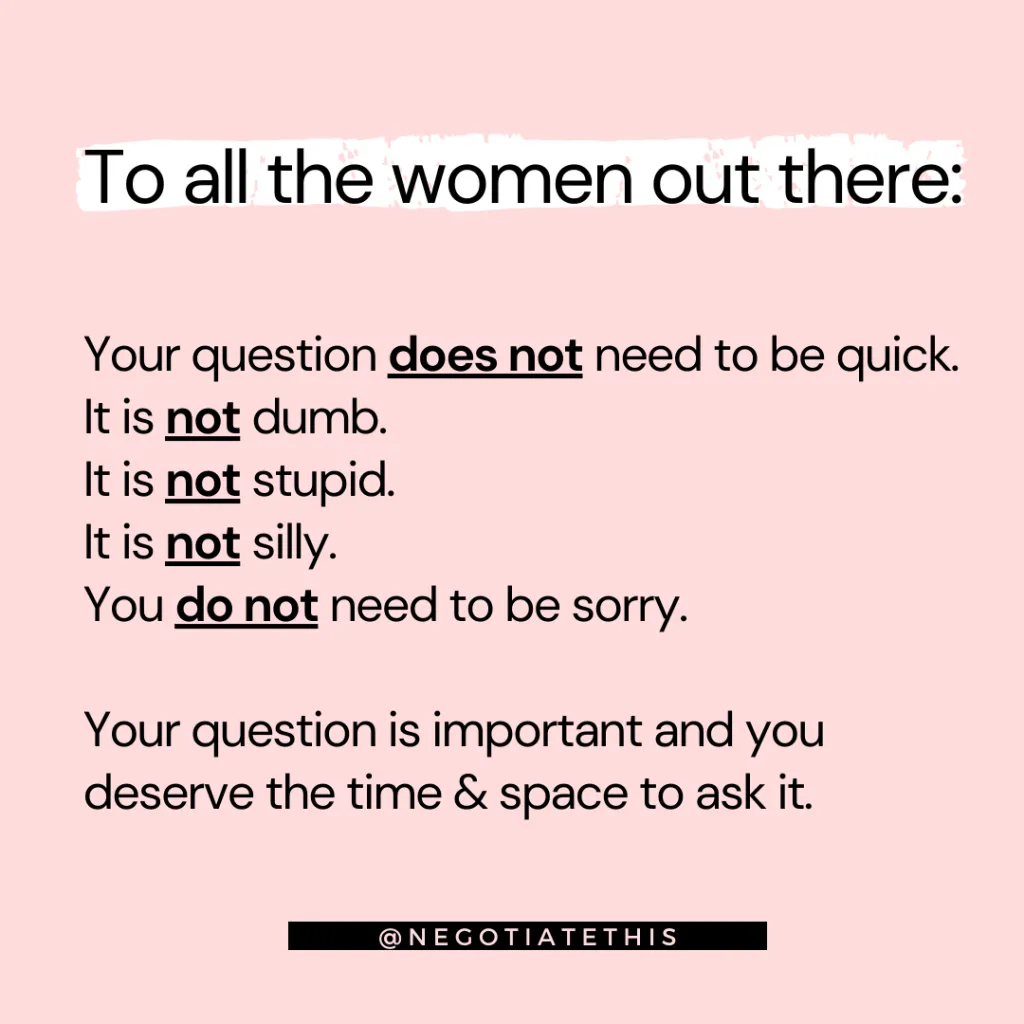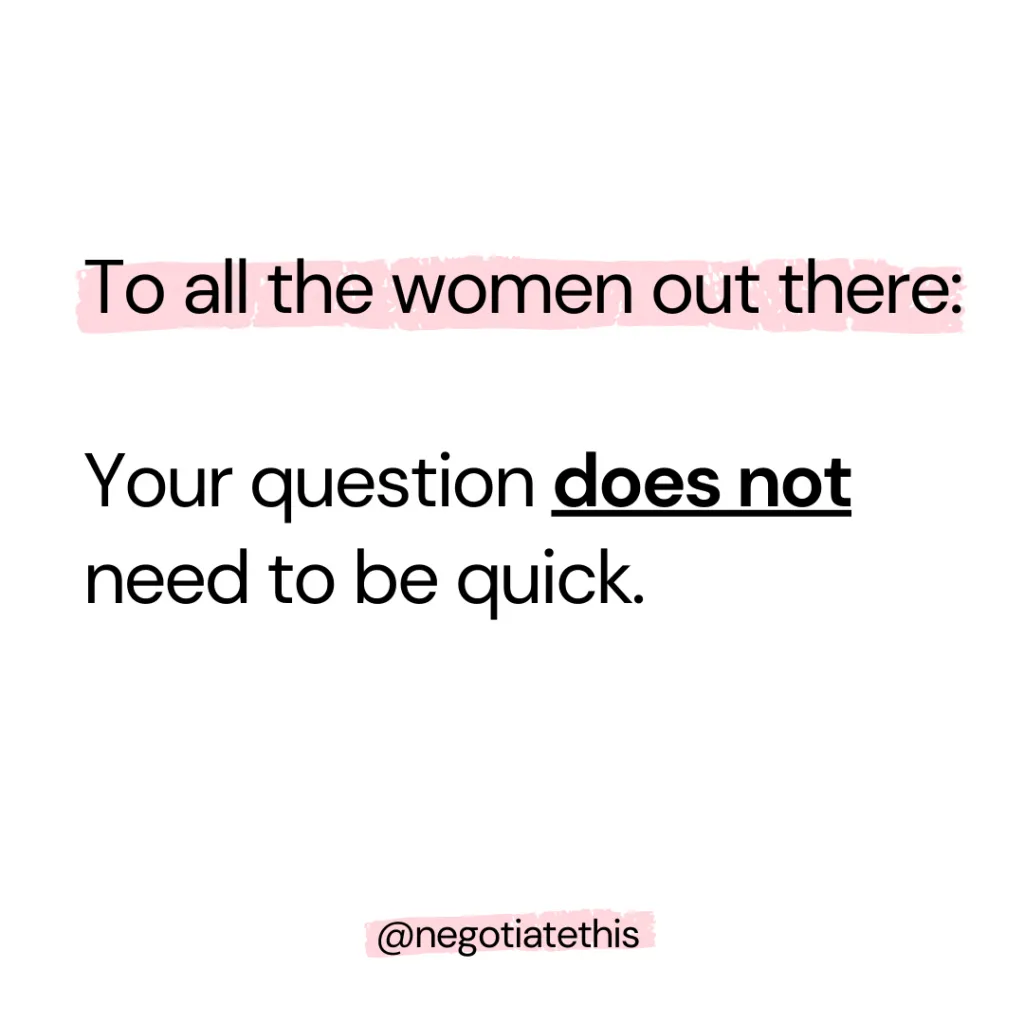When women asked a question, it differed from how men did. Does it matter?
I recently attended a conference where 10 people asked a question after a speaker presentation: 7 men & 3 women.
- 2 out of 3 women started their question with: “I just have a quick question…”
- 0 out of 7 men started their question with: “I just have a quick question…”
Does it matter?

Immediate Questions
I immediately had questions after I heard the way different genders asked questions. Why were the women’s questions “quick”? Or why did the women feel like they had to have “quick” questions?
It’s not like they actually were much shorter questions. They were likely the same length as the men’s questions, though to be honest, I did not have a timer and I was not timing each question that was asked.
So even if the women’s questions were or were not quick, why did they have to preface their question? Why did they feel the need to let the speaker, audience & themselves know it was just going to be a “quick question”?
I only picked up on it after I heard more than 1 woman start a question like that. After the first woman, no big deal. I think it’s minimizing a bit, but I’m not going to think twice about it.
More Questions
A couple more (men) asked questions. Not quick. Loud & long & confident. No qualifiers, no words to preface the question, just got right into it.
And then another woman asked a question. And she said “I just have a quick question”…
Wait. What? Why is 1 gender saying their questions are going to be quick when the other gender is utterly just not?
Is This a Gender Thing or Am I Reading Into It?
And then I listened intently for the next questions to see if my “theorizing” was just in my head. I was also secretly praying that a man would make his question “quick” so my theory could be debunked and that would be the end and we wouldn’t have to hurl ourselves into yet another question of “women say this – how does it impact them” discussion & analysis.
To be clear, this is not supposed to be a “Change your ways, women!” post… but alas, I did study language & communication & am a firm believer that language, if not shapes, at least has some part in creating the world around us.
And after listening to all the questions (10 is an estimate… I only started counting after about 4 after I heard 2 women with a “quick question)… I was defeated to find that 2 out of 3 women had a “quick question” and 0 out of 7 men had a quick question. (I also desperately wished that more women would have asked questions… but that’s a different blog post…)
I don’t know why my brain automatically counts how many men & women ask questions. But it does. At least that day it did. I suppose it’s partly why I have this platform. So I’ll analyze it when my brain does go there. And you’ll go there with me if you’re reading this.
Why Did Women Feel the Need for “Quick” Questions?
Why did women feel the need to say that their question would be “quick” – when it was likely just as long as the men’s questions? And alternatively, why didn’t even 1 man tell us that his question would be quick? There were more than double the amount of men that asked a question. And not 1 promised us they were going to make it quick.
It would be naive to dismiss the rallying cry coming from some saying: “Quit calling out women for how they speak!” It is heard & validated. And that’s an important part of the discussion.
That has its place. So much advice out there puts the onus on the people in positions of vulnerability or those not as represented in positions of power. Conversely, people in positions of power get off easy by telling the underdogs that they need to change their ways.
The bottom line is that both can be, & a lot of times are, true.
Lots of things need to take place to create change.
Communication Counts
The way people communicate has definite and clear impacts on the world around them. Calling attention to communication can alter the way we see the world, the way we are perceived, and the way we perceive others. It can’t do everything. But it can be building blocks for a shift.
Wondering Why It Has to Be Quick
Women feeling the need to make their question quick could have a few rationalizations.
It could be seen as doing a favor to those around her. She is making the question quick, so keeping the flow going for potentially more questions or dialogue to take place. It could even be viewed as thoughtful.
But why would she feel that she owes anyone around her, (mostly strangers) time? And why wouldn’t she feel that her question is not a worthy use of time to the speaker (who asked people for questions) or a worthy use of time for everyone else that she would need to let everyone know that it would be quick? Why wouldn’t it be worthwhile to take time to ask a great question & then unpack a great question? After all, everyone benefits from a good question asked.
Maybe the woman is thinking of others around her & that they may too want to get their questions answered, maybe even more time for more women to ask (because damn… more women asking questions really could have benefited that whole crowd).

Women Deserve To Ask Long, Descriptive Questions
But let’s not overlook the other item. If a woman is doing a favor for those around her, does that mean she is minimizing herself, her needs & her question? Not all the time… but not not all the time. You get me?
Women deserve to have long, full, descriptive questions. They are worth the speaker’s & everyone else’s time. They’re worth their own time. That might sound silly to say but… is it?
Gender Differences in Language
One argument about women asking a “quick question” is that it’s just a normal part of gender differences within language and that it shouldn’t be a topic of discussion. Women communicate differently than men and that’s okay. That’s understood.
But what if the language used has unintentional impacts? Wouldn’t it be worthwhile to first analyze it & then if necessary, make a shift?
Minimizing
Prefacing a question as “quick” could be deemed as minimizing. By saying that the question is going to be quick, if only through language, it demonstrates the need to take up less time & space.
Diminishers When Asking a Question
When prefacing a question, specifically saying “I just have a quick question”, it has a diminishing effect. And there is no reason to diminish when asking a question.
The speaker asked for questions. There was time to ask questions. The questions were good. There was plenty of time to ask more questions.
“Diminshers [are] verbal attempts to connect through submission” (Chance, p. 73, 2022). “We tend to use them in situations where there’s an imbalance of power or status, and we do it more often when we’re on the low end – when we feel our safety or well-being may depend on being liked” (Chance, p. 73, 2022).
Some women may have felt inclined to use a diminisher because the speaker could have been perceived as a person of a higher status (afterall, he was the speaker).
But yet… none of the men felt the need to use a diminisher. Is it because they don’t believe they are of lower status & therefore women… do? Does humility play a part in this question & gender difference?
Perceived Status Plays a Part
“Higher status people don’t care what others think of them, although some who do care diminish themselves in order to avoid coming across as arrogant or controlling” (Chance, p. 73, 2022). It’s not bad that women don’t want to be perceived as arrogant or controlling. That’s a good thing. But it may have impacts in other situations.
Other examples of diminishers in conversation include: “I thought maybe… Can I ask a stupid question?… I’m sorry, but…” (Chance, p. 73, 2022). “Diminshers express caution and vagueness” (Chance, p. 73, 2022). And the goal of any conversation or situation is typically the opposite. We don’t often want to be cautious or vague.
By saying she has a quick question, she is showing (or could be perceived by others) that she is not worthy of that time. And if she does not deserve to take up time to ask a question or feel that her question is important, then others may think that too. These are when unintended consequences of communication styles come into play.
Not To Be Confused
*This is not to be confused with diminishing regular speak such as generational terms, dialects, and filler words that are a common part of modern language. These are very different from “diminishers” which are “verbal attempts to connect through submission” (Chance, 2022)
Diminishers not to be confused with words that are common verbiage of everyday language.
But this is different.
Skip the “Quick” Part – or Diminsher
One easy tip to reduce diminishers from conversation or questions is to “know that most can simply be skipped” (Chance, p. 75, 2022). Just skip that part of the question. Don’t say it’s going to be a quick question, just get on with it. Just ask the question.
This isn’t the only way to diminish questions.
Here are ways I’ve seen people (mostly women) qualify (& diminish) their questions:
• This might be a stupid question, but… – It’s NOT stupid.
• This might be silly, but… – It’s NOT silly.
• Silly question… – It’s NOT. It’s valid.
• You probably already answered this – They DIDN’T.
• Dumb question, but.. – It’s NOT dumb.
• I just have a quick question.. – It DOESN’T need to be quick.
• If I can just take a moment of your time… – Take MORE than a moment.
• Sorry, I just have a quick question.. – You DO NOT need to be sorry about asking a question.

Again:
It does not have to be quick.
It is not dumb.
It is not stupid.
It is not silly.
You do not need to be sorry.

Your question is important and you deserve the space & time to ask it. Period.
Nothing more, nothing less.
Ask your question. It’s a good one.
**This item goes beyond women. It typically is seen among those historically marginalized and for those who do not hold as many positions of power or are not represented as frequently in positions of power. This topic spans beyond gender and is not solely based on 2 genders.

Source
*Book: Influence is your superpower: the science of winning hearts, sparking change, and making good things happen (2022)
Author: Dr. Zoe Chance
Disclaimer: While the contents of this post and blog come from research and personal experience, each experience, situation and/or person has their own unique circumstances. This is not negotiation, financial or any other form of legitimate or official advice from an expert. Each individual should do their own independent, comprehensive research. Negotiation, career and all other decisions are the sole responsibility of each individual or party. Details found on the blog and in individual posts are opinions and should be treated as such for entertainment purposes only. Read further disclaimer information on the Disclaimer page.
You might also like…
Check out more blog posts you’ll like.
